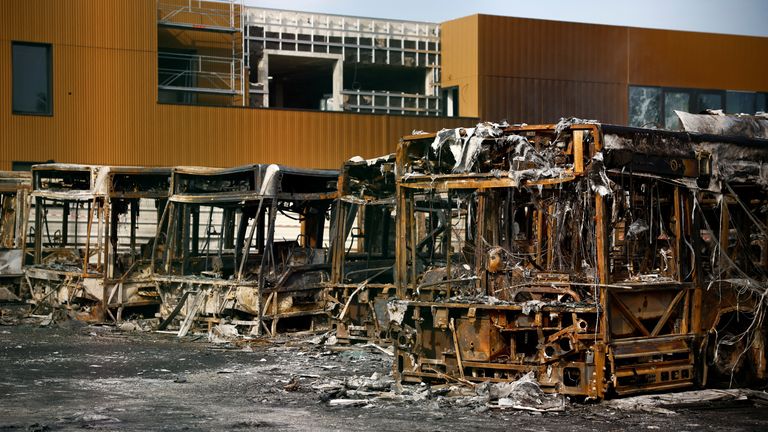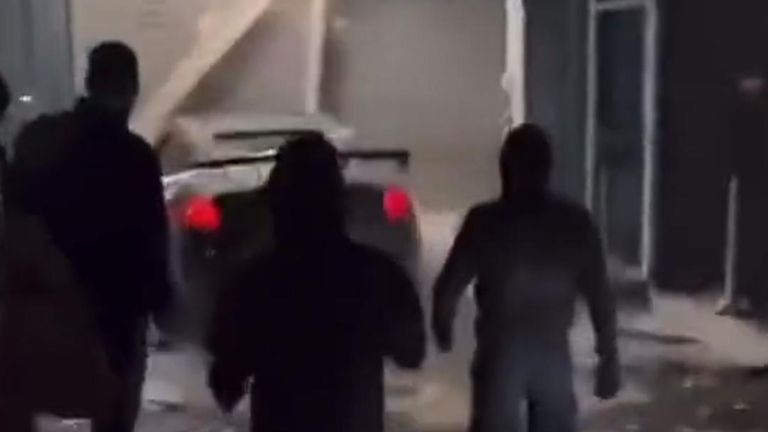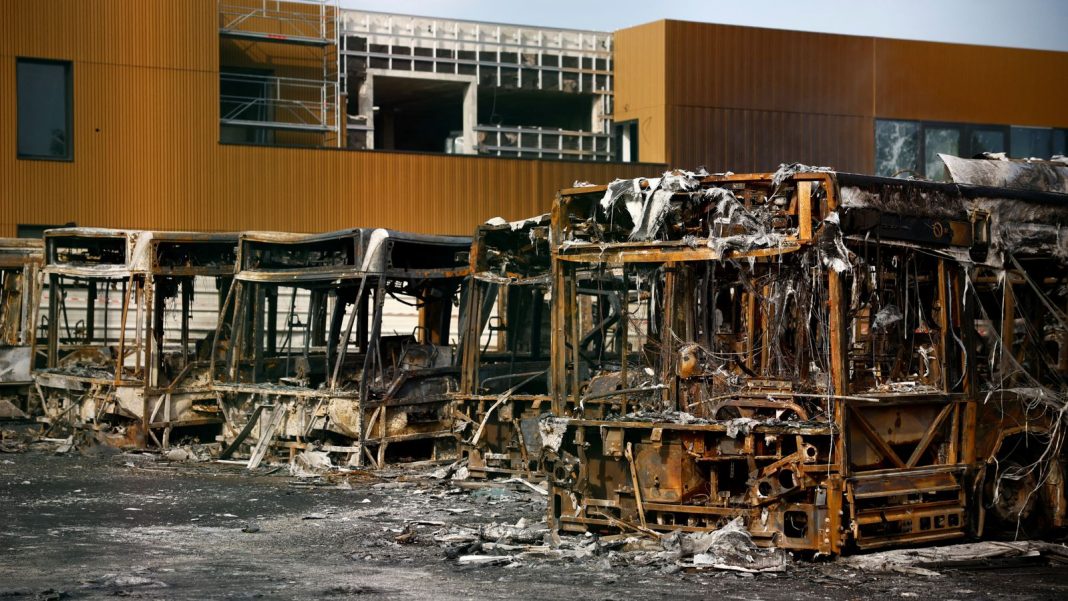As morning broke in Nanterre, the extent of the damage became evident.
Thursday was the worst night of violence so far this week following the fatal shooting of 17-year-old Nahel by police at a traffic stop in the Parisian suburb.
In one road, we saw at least a dozen cars totally burnt out.
A few hours earlier, we had watched as numerous rockets and fireworks were launched at police.
Police and youths clash in Nanterre during the early hours of Friday
Every now and then big groups of demonstrators, dressed head to toe in black, would surge through the rabbit warrens of streets criss-crossing the estate.
Some ran, others rode on electric scooters or mopeds.
An unseen force in the distance was pushing them back.
We knew it was the riot police in armoured vehicles.
Some of the 40,000 officers on duty across France as the authorities tried to regain control of the situation.
It didn’t work.

Burnt-out buses at a depot in Aubervilliers, Paris, following another night of violence
This morning as residents woke to discover their ash-filled shells of cars, some local businesses were also clearing up.
Jean-Pierre De Valière’s estate agency has been trashed.
The front windows have been shattered and have caved in. Inside, the photocopier and computers have been broken.
His whole life’s work destroyed in just a few minutes.
‘Senseless violence’
He said: “I think they’ve gone too far. That won’t move things forward. It’s a bit of senseless violence.
“The context is complicated. It’s the death of a child from this area that’s at the forefront of our minds. Everyone’s grieving.”
The grief is now mingling with shock at the unrest.
Many want justice for Nahel, but don’t support the violence.
Hassen has lived in Nanterre, Paris, for six years with his family. He describes it as a beautiful place. He is devastated by what has been happening.
Please use Chrome browser for a more accessible video player

0:26
Car smashes into a supermarket during third night of demonstrations
Read more:
Analysis: Tear gas and stun grenades won’t stop riots
Why are people protesting in France?
“It’s really sad,” he said. “We are sad, first of all for the child who died in this circumstance, it’s very sad for his family.”
“Do you understand the actions of people who are smashing up the shops?” I asked.
He admitted he was frustrated.
“I want to say that behind these businesses there is also people. They [the businesses] are their life and they are creating jobs and providing opportunities to the young people.
“When they break this kind of business and the city, in fact, they’re breaking their life, too,” he replied.
As some search for answers, other have turned to blame.
President Emmanuel Macron has been criticised by a far-right politician for going to an Elton John gig as the violence took hold on Wednesday.
In turn, following a crisis meeting on the riots, the president blamed social media for fuelling the violence and asked parents to stop teens from joining the protests.
“It is the parent’s responsibility to keep them at home. And so it’s important for the calm of everyone that parental responsibility is fully exercised and I call to the sense of responsibility of mothers and fathers,” he said.
But blame doesn’t help residents living in areas like Nanterre who are watching their community crumble.
“There are families that are fed up with this violence but they can understand the anger with everything that’s happened.
“You’ve got the cars that are burned – it could be your car,” said Alain, a ceramics maker with a studio now surrounded by charred vehicles.
‘The roots of the unrest are much deeper’
He admitted Nahel’s death is the catalyst for this unrest but believes the roots are much deeper. He said work needs to be done to rebuild trust between the police and young people.
The government is prioritising stopping the riots and announced more police will be deployed and buses and trams will stop countrywide at 9pm.
It’s unlikely to make much difference tonight as France is already bracing for another night of violence







